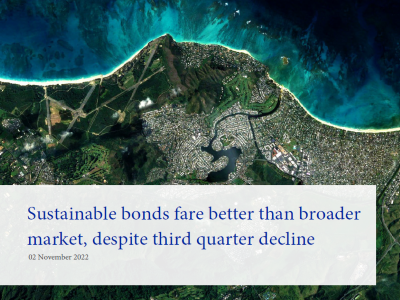

Procuring a second-party opinion (SPO) entails assessing an issuer’s green, social, sustainability and sustainability-linked (GSSS or ‘sustainable’) bonds and loans to ensure that they are aligned to established market standards and the extent to which they are likely to contribute to long-term sustainable development. In theory, this independent review by a third party provides substantiation that the bond’s proceeds align with the intent and commitments as stated to investors, thereby bolstering confidence and improving reporting standards.
However, questions have been raised as to the efficacy of SPOs, especially when it comes to measuring ‘real’ sustainability efforts and not just serving as box-ticking exercises. Investors in GSSS bonds are driven by two concerns: first, will there be a satisfactory return on investment; and second, how ‘sustainable’ are they in reality
Some investors may not require an SPO to have confidence in their issuer’s bonds, though the question then becomes how exactly are investor attitudes towards SPOs evolving? And to what extent is this motivated by changing standards and concerns in the marketplace?
Bond issuance plateaued over the first three quarters of 2022, driven in large part by a lack of confidence in market rates across the board. Despite GSSS bonds being relatively novel and the challenging financing conditions of last year, sustainable bond volumes were down less than the broader market, indicating resilience.
Confidence in sustainable bonds
A Moody’s report from November found that global issuance of GSSS bonds totalled $215 billion in the third quarter of 2022, down 13% from the third quarter of the previous year, and down 10% from the second quarter of 2022. Across the four segments, there were $119 billion of green bonds, $41 billion of social bonds, $47 billion of sustainability bonds and $8 billion of sustainability-linked bonds.
The report predicts ‘sustainable bond issuance growth’ to resume when market conditions become more favorable, anticipating that GSSS bond volumes would fall short of the previous year’s total, with around $900 billion of issuance for the whole of 2022. Yet despite the market headwinds, sustainable bond issuance was stronger than the broader market, which was down 27%, as of 30 September 2022. Sustainable bonds are down a comparatively smaller 17%, increasing their share of global bond issuance.
SPOs are likely to play a significant role in helping to support such recovery. Having initially been borne out of a need for bolstering both investor confidence and issuer credibility, SPOs today may also contribute to more efficient decision-making and markets thanks to more robust and well-understood assessment and scoring methodologies.
“The continued evolution of both thematic issuance frameworks and SPOs is similar to that of standardised bond prospectuses and credit ratings in the past, in the sense that they promote market efficiency,” explains Tobias Lindbergh, SVP and head of SPOs for EMEA and APAC at Moody’s Investors Service. “Regulation and continued work by standard-setting non-governmental bodies is likely to continue to promote further standardisation and further boost investor confidence in the thematic debt space.”
While an SPO does not eliminate the need for an investor to perform its own assessment, it may provide additional confidence that the structure aligns with relevant market principles and allow a greater understanding of the issuer’s ability to achieve the intended contributions to sustainability.
Alternative views on SPOs
SPOs can offer something of a guiding hand through this stormy period as interest rate shifts have investors trying to anticipate what further hikes are on the horizon.
“During market turmoil, the value proposition of thematic issuance may actually increase,” Lindbergh says. “Due to the continued scarcity of thematic bonds, it may be easier to successfully go to market with a thematic than a non-thematic offering in such periods.”
Despite the supposed stabilising influence of SPOs during periods of market turmoil, however, there is very little data available – beyond anecdotal evidence – to precisely measure their efficacy.
Lindbergh counters that the Climate Bonds Initiative ‘State of the Market’ report from last year demonstrated that not only were SPOs an important guiding influence for investors in sustainable bonds, but that a clear majority of green bonds that received some form of external review in 2021 were covered by SPOs. This indicates that to a large degree both investors and issuers demonstrate confidence in SPOs and their efficacy.
“There are multiple venues and platforms that require SPOs,” Lindbergh says. “Take the Luxembourg Stock Exchange, for example, which for many years has had a segment dedicated to thematic bonds. It strictly controls access to that segment, requiring issuers to follow relevant standards or principles, such as the ICMA [International Capital Market Association] Green Bond Principles, and to provide the exchange with a completed third-party external review, such as an SPO.
“Ultimately, requirements like this improve issuing standards in the marketplace because they elevate the need for third-party assessments out of the realm of good-faith recommendations and best practices towards an industry requirement that promotes transparency and rigour across the board.
“Think about it from the perspective of a fund manager,” Lindbergh continues. “On a normal day in a strong market, you might have three or four potential thematic deals that you can invest in, potentially even more. Both credit ratings and SPOs provide third-party independent insights that are supportive of an investor’s assessment and decision-making of the different deals on offer.”







